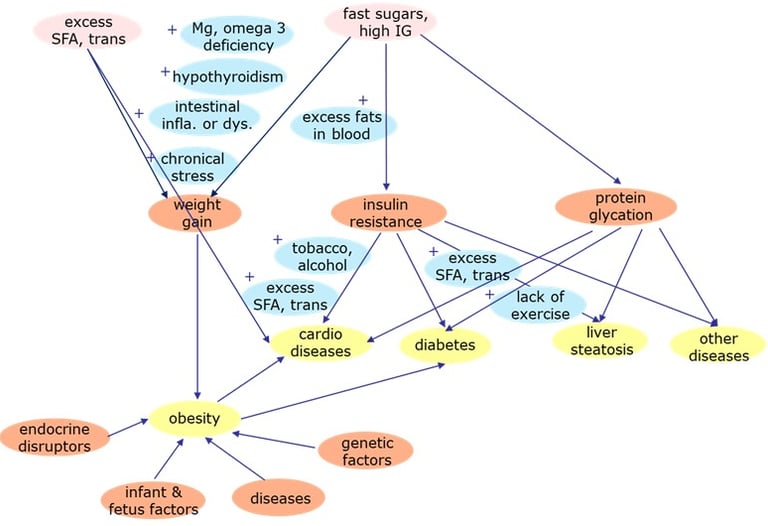Weight gain: too fatty or too sweet?


One or the other, or both (and excess salt doesn't help either)
We can become overweight by eating too much fat, especially saturated and trans fats, which have other deleterious effects. But we can also become overweight by eating too many sugars, especially fast sugars.
But how? First, one shouldn't confuse dietary fat with body fat. To produce energy, our body's cells convert glucose from food into a substance called pyruvate, which in turn undergoes several transformations to produce ATP, our body's chemical form of energy. If it’s not to be used directly for energy production, glucose is instead stored as glycogen in our liver and muscles (glycogen can be used later by being converted back into glucose). If glycogen stocks are already full, it is converted into fat, more precisely into triglycerides stored in our fat cells (it can also be used later by being converted back into glucose).
These storage and retrieval processes are controlled by insulin and glucagon, produced by the pancreas to regulate blood sugar levels. The faster the ingested sugar, the faster and higher blood sugar rises. This leads to greater storage, via the action of insulin, which is then produced in greater quantities to restore blood sugar levels. This is how the ingestion of too much sugar in relation to energy needs results in storage in the form of body fat, making the impact of fast sugars even more penalizing. To lose weight, it's better to look at glycemic indexes (GI) rather than calories (for example, 300 kcal of cookies doesn't have the same impact as 300 kcal of lentils).
Salt also plays a role, as sodium increases the absorption of glucose into the blood through the intestinal mucosa.
For the sake of completeness, I should also mention the other factors that contribute to weight gain:
Stress, via reduced serotonin production, which reduces satiety, and increased cortisol production, which increases appetite.
A sedentary lifestyle, not just because we burn fewer calories by being less active, but because it has a negative impact on our metabolism.
Lack of sleep or disruption of the sleep-wake rhythm, which also has a negative impact on metabolism.
Problems with the intestinal microbiota with a deficit in the production of short-chain saturated fatty acids such as butyrate and propionate, resulting in i) a drop in leptin, the satiety hormone, and a drop in serotonin synthesis, which reduces satiety and ii) an increase in calorie extraction.
Hypothyroidism, which slows down metabolism, including the conversion of food into energy (rather than its storage as fat).
Deficiencies in certain nutrients, including magnesium, needed for energy production, and omega 3, which counteract the production of fat cells by omega 6.
These are the same factors that make it so difficult to lose weight, along with a few others, such as insulin resistance.
In fact, the mechanisms of weight gain, the development of insulin resistance, diabetes, obesity and even cardiovascular disease and other illnesses such as liver pathologies, are interrelated. I've produced this diagram which shows these interrelationships in a somewhat simplified way:
To find out more, also read these articles:
On the particular case of menopause: https://isabellemaesnutrition.com/en/menopause
On fasting, a practice that can help you reset the way you eat: https://isabellemaesnutrition.com/en/fasting
On the issues of processed foods compared to a natural diet: https://isabellemaesnutrition.com/en/processed-foods
On the mechanisms involved in obesity and how to tackle this pathology: https://isabellemaesnutrition.com/en/obesity
On the concept of glycemic index, its role and how to modulate it: https://isabellemaesnutrition.com/en/glycemic-index
On intuitive eating, to free yourself from the dictates of dieting: https://isabellemaesnutrition.com/en/intuitive-nutrition
On how to broaden the range of foods that have a place in a healthy diet: https://isabellemaesnutrition.com/en/forgotten-foods
Candyfloss picture by Yarden


